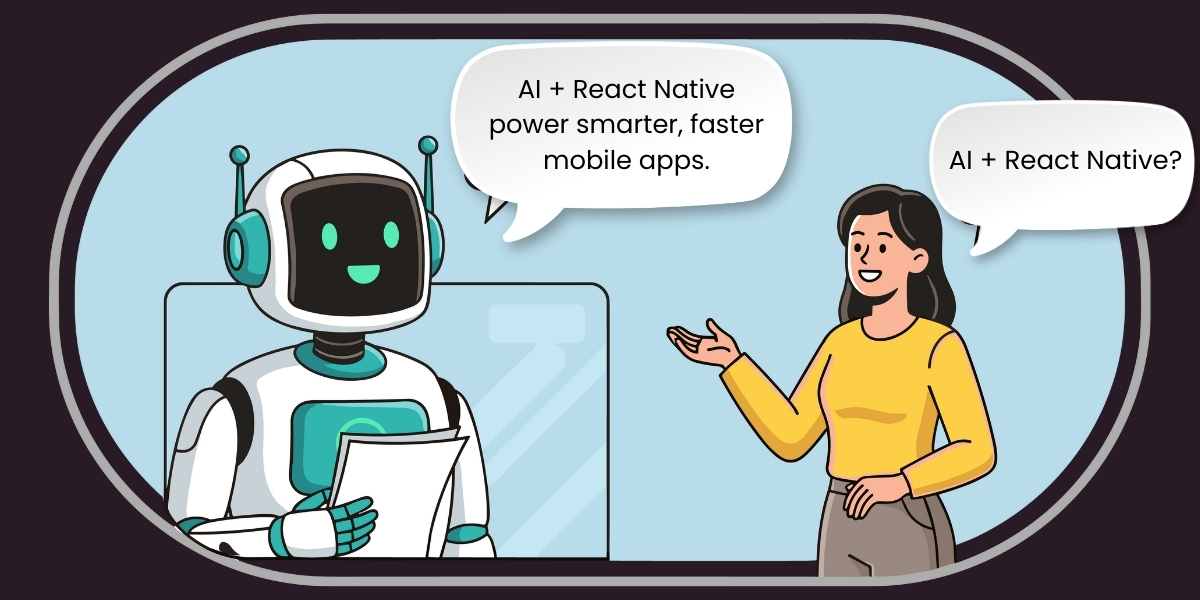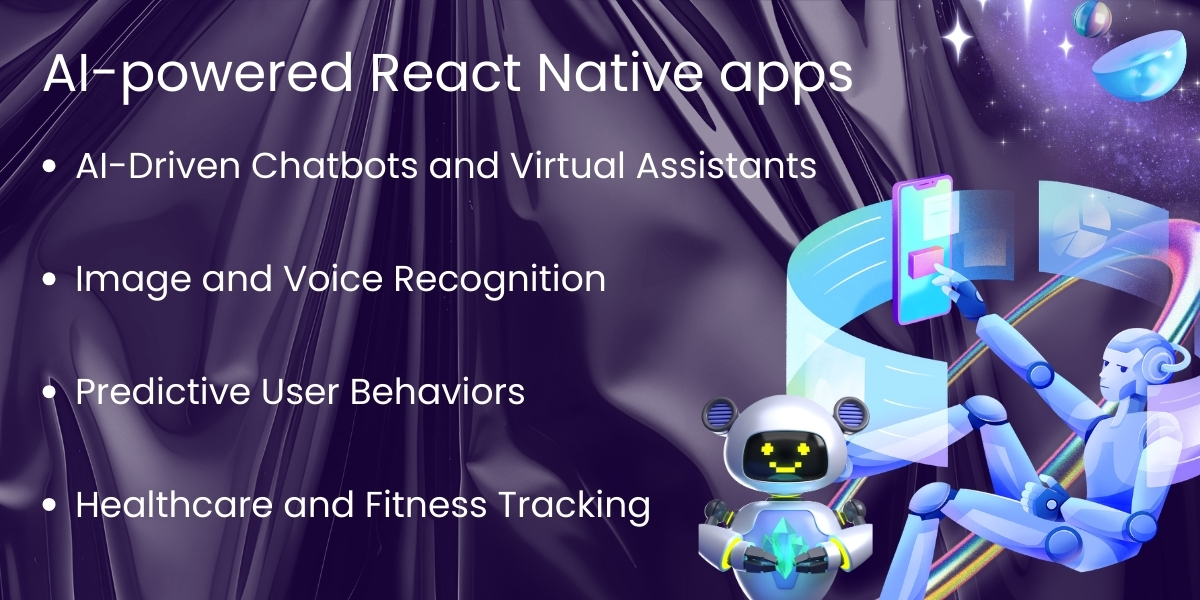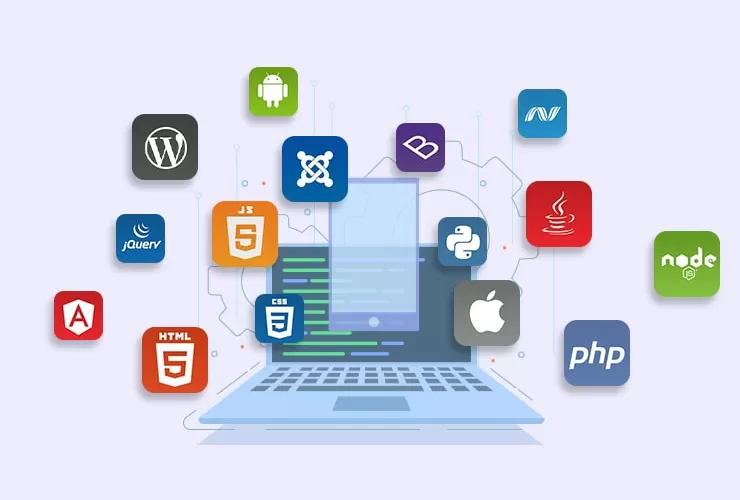The combination of Artificial Intelligence (AI) and React Native is transforming how modern mobile applications are created and used. By merging React Native’s cross-platform flexibility with the learning and predictive power of AI, developers can now build apps that are smarter and more responsive.
These AI-powered apps can adapt to user needs in real time, making them faster and more personalized than ever before. This powerful blend is reshaping the mobile landscape—driving innovation, automating workflows, and boosting overall user engagement.
1. The Power Couple: AI Meets React Native
For some time, React Native has been recognized for its developer-friendly approach to building high-performance, cross-platform mobile applications using a single codebase. Now, by combining React Native with AI-powered technologies like Machine Learning (ML), Natural Language Processing (NLP), Computer Vision, and Predictive Analytics, developers can create smarter and more adaptive apps.
AI integration allows these applications to interact in more human-like and intelligent ways. With AI, advanced features such as speech recognition, sentiment analysis, real-time translation, and behavioral prediction become possible.
As a result, apps can think, learn, and evolve over time. This enables developers to deliver solutions that are not only functional but also context-aware and highly personalized—qualities that today’s users value the most.
2. Applications in the Real World
AI-driven React Native apps are transforming the future of industries ranging from eCommerce and healthcare to entertainment and finance. Additional strong use cases can be considered; unique to more than one industry, we want to highlight:
AI-Driven Chatbots and Virtual Assistants:
By incorporating AI-driven chatbots into React Native apps, a new layer of customer engagement can be built around consistent, intelligent, and personalized support. For example, eCommerce applications use AI chatbots to provide product recommendations, answer inquiries, and assist a person in need at any time of day.
Image and Voice Recognition:
By using existing AI frameworks such as TensorFlow.js and Google Vision API, developers can implement apps that conduct visual processing (i.e., images being analyzed, faces being recognized) and process voice inputs (i.e. text-to-voice repositories). These features enhance app accessibility, security, as well as interactivity — particularly for applications featuring biometric authentication or voice search.
Predictive User Behaviors:
AI can assist apps in gaining valuable information from user interactions, assisting the app in recommending content, optimizing navigation, and improving retention rates. Streaming applications like Netflix and Spotify have contributed to apps serving intelligent recommendations, using AI. Many React Native apps can leverage AI to gain these insights as well.
Healthcare and Fitness Tracking:
React Native apps that leverage AI have the ability to monitor health data, detect anomalies in the data, and sometimes make prediction of consistent medical trends over the course of time, offering statistically-significant users actionable items for improving their health.
3. Advantages of AI-Driven React Native Apps
Introducing React Native with AI unveils an array of genuine advantages for developers, companies, and end users alike:
Customized Experiences:
AI customizes app interfaces and content based upon user use, preferences and interaction history that creates worthwhile user engagement and satisfaction.
More Intelligent Automation:
AI can automate repetitive or manual tasks for instance content tagging, sending push notifications and customer segmentation that saves time and operational costs.
Insights from Data:
AI can convert app raw data into data that the business can leverage used to make decisions on app features, marketing/advertising strategy and customer behavior patterns.
Cross-Platform Development:
By using React Native’s shared codebase, developers can integrate AI features once and deploy on both Android and iOS, that saves time and cost.
Improved Security:
AI can identify unusual activity patterns and prevent fraud. AI can also help with user data security using behavioral analytics, biometric systems and analytics.
4. AI Integration Tools and Frameworks
There is now an expanding toolkit of tools to aid developers in the integration of AI into React Native applications:
TensorFlow Lite & TensorFlow.js:
- Best suited for integration of lightweight ML models directly into mobile applications.
- Core ML (Apple) & ML Kit (Google):
- Provides on-device AI capabilities for tasks such as image recognition, text translation, and face detection.
PyTorch Mobile:
- Enables powerful deep learning models to run efficiently on mobile devices.
- OpenAI API & AWS AI Services:
- Encourage cloud-based intelligence for natural language understanding, image generation, predictive analysis, etc.
LangChain and Hugging Face:
- Good resources for advanced AI such as natural language generation, summarization, chat-based experiences, etc.
- With these tools, developers can ensure app performance and responsiveness while adding AI-enhanced features to a React Native application.
5. The Future
The interplay of AI and React Native will transform what mobile apps are capable of, not only responding to user input, but anticipating user needs, responding to emotions, and providing preemptive solutions.
We will witness the following advances:
- Edge AI for React Native, enabling AI processing directly on devices, resulting in faster and offline capabilities.
- Generative AI built into the application, which will create content, interfaces, or responses, on-demand.
- Predictive UI, whereby apps will automatically shift layouts or workflows based on user intent and patterns in behavior.
- AI-Enabled Testing, wherein the app could automatically find bugs or performance hitches and fix them on behalf of the user.
We can anticipate a future of intelligent, responsive, and self-improving applications, and React Native will be one of the key platforms that drive this change.
Conclusion
The combination of AI and React Native is not only modernizing mobile app development, but actually transforming the entire product experience ecosystem. Together, they allow businesses to create applications which are genuinely cross-platform, cost-effective, and rapidly evolving with each interaction.
As AI becomes ubiquitous and implementations like those seen in React Native continue to innovate, developers and organizations who harness the combination will lead mobile development into the next generation of smart, connected, and future-proof applications.
Empower your mobile app with AI-driven intelligence and React Native’s cross-platform power to deliver smarter, more engaging user experiences and boost business performance.
Frequently Asked Questions
AI integration enhances React Native apps with smarter features like personalized user experiences, voice and image recognition, predictive behavior insights, and automated workflows.
Developers can use tools such as TensorFlow.js, TensorFlow Lite, OpenAI APIs, Core ML, PyTorch Mobile, and AWS AI services to embed AI capabilities into React Native apps.
AI-enhanced React Native apps are used for chatbots, virtual assistants, visual search, voice recognition, personalized recommendations, and health or fitness tracking.
AI integration drives higher engagement, better user personalization, automated support, valuable data insights, and improved user satisfaction in mobile experiences.
Yes — AI features like behavioral analytics and anomaly detection can help identify unusual patterns and enhance security in mobile apps.
















